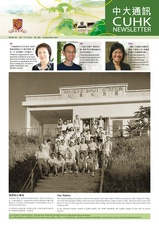How did you get into mental health-related social work?
I was fascinated by anything to do with human psychology, including portrayals of madness in film and literature, so I knew early on in life that I would be working in a related area. In the last year of my social work studies, I interned in the psychiatric unit of the United Christian Hospital. The moment I stepped into the ward, I thought, ‘This is it!’ I joined their clinic after graduation and worked there for seven years as a medical social worker. That was an excellent team and I was on the edge of my seat trying my best to learn. No two cases were the same. My patients were a mirror to me and led me to ponder many questions. Those seven years laid the direction of my career.
You’ve conducted many studies that have as their subject mainland Chinese society. What topics have you covered?
I studied mainly how to use family therapy to help anorexic patients. The project began in 2001 and finished over a year ago. I would spend half a day every week at the Shenzhen-Hong Kong Family Practice Centre in Nanshan Hospital in Shenzhen, providing therapy to families who needed it and doing my research in the meantime.
What difficulties did you encounter conducting research and offering therapy on the mainland?
There were a lot of people in need, but fewer cases than one would imagine. The general public and even medical professionals lacked knowledge about family therapy, psychological therapy, mental health, and social work, so referrals weren’t made on time. A small number of doctors would also hang on to patients to ensure an income. I knocked on quite a few closed doors in my first year there.
What was communication with your subjects like?
The Cultural Revolution has had far-reaching impact on the people’s psyche, and one of the effects was the lack of trust. Though my patients wanted to consult me because I was from Hong Kong, many used false names, because ultimately they were still mistrustful. They would never release information as simple as their monthly salary. Shenzhen is a city of immigrants. My subjects came from Northeastern China, Xi’an, Inner Mongolia, and Guizhou, etc. They all had different customs and traditions. It had a huge impact on me.
What makes you persist in your work on the mainland?
The simple belief that since we’d benefited from the teachings of the Americans and the British, or from that of Hong Kongers educated in those countries, I should spread my knowledge now that it was needed by someone else. I am considered an experienced professional in Hong Kong. The mainland experience exposes me to completely different people and environments. It offers rare inspiration, stimulus and a chance for professional growth.
What is the greatest pressure faced by social workers?
Our society is shrouded in populism and intolerance. It’s depressing. People ask what society owes them, what society can give to them, and not what they can do for society. Social workers do not just deal with cases, but need to grapple with the problems brought about by councillors and political sparring. It’s not only a challenge for social workers, but also for medical professionals and the rest of society.
What are you most proud of in the department?
Students who do their best and who keep growing. The culture upheld and passed on from teacher to student. Colleagues who not only exceed their publishing requirements but devote themselves whole-heartedly to the nurture of students. Alumni who come back, despite busy schedules, to mentor students, and offer them internship opportunities in their organizations.
How has the concept of social work developed in China?
The concept was planted in 1949—Yenching University had a social work subject. But after that up until the 1980s, the concept was absent though there was social welfare. Hong Kong is ahead of the mainland in this regard by 50 years. But the mainland has been trying hard to catch up in recent years. Mainland officials visiting our department have told us that they realized there were huge social conflicts in society and a disregard for the importance of social work would entail serious social and political costs. The Six Plenary Session of the National Congress of the Party in 2006 passed the policy to ‘create a team of social work talent of a reasonable structure and excellent quality.’ Once it was disseminated, over 200 social work programmes appeared in universities on the mainland, including close to 100 master’s programmes. That said, not many actually walked their talk.
How can Hong Kong contribute in this regard?
The Department of Social Work of CUHK has played a complementary role on the mainland. Half of the students on MPhil and PhD programmes in social welfare are mainland students, and a third on the Master of Social Science programme. Many return to mainland China after undergoing the vigorous academic and professional training. We also render service to mainland universities by inviting scholars to audit classes in Hong Kong and by organizing seminars. The Research Centre for Social Policy we jointly set up with Nankai University in 2008 holds regular seminars for students from Hong Kong, Taiwan and mainland China. 


































































































































































Social Bookmarks